Secret Body
EROTIC AND ESOTERIC CURRENTS IN THE HISTORY OF RELIGIONS
Jeffrey J. Kripal
THE UNIVERSITY OF CHICAGO PRESS
Chicago and London
The University of Chicago Press, Chicago 60637
The University of Chicago Press, Ltd., London
2017 by Jeffrey J. Kripal
All rights reserved. No part of this book may be used or reproduced in any manner whatsoever without written permission, except in the case of brief quotations in critical articles and reviews. For more information, contact the University of Chicago Press, 1427 E. 60th St., Chicago, IL 60637.
Published 2017
Printed in the United States of America
26 25 24 23 22 21 20 19 18 17 1 2 3 4 5
ISBN -13: 978-0-226-12682-1 (cloth)
ISBN -13: 978-0-226-49148-6 (e-book)
DOI : 10.7208/chicago/9780226491486.001.0001
Library of Congress Cataloging-in-Publication Data
Names: Kripal, Jeffrey J. (Jeffrey John), 1962 author.
Title: Secret body : erotic and esoteric currents in the history of religions / Jeffrey J. Kripal.
Description: Chicago ; London : The University of Chicago Press, 2017. | Includes bibliographical references and index.
Identifiers: LCCN 2017015351 | ISBN 9780226126821 (cloth : alk. paper) | ISBN 9780226491486 (e-book)
Subjects: LCSH: SexReligious aspects. | EroticaReligious aspects. | OccultismReligious aspects. | ReligionHistory.
Classification: LCC BL65.S4 K75 2017 | DDC 204/.2dc23
LC record available at https://lccn.loc.gov/2017015351
 This paper meets the requirements of ANSI / NISO Z 39.48-1992 (Permanence of Paper).
This paper meets the requirements of ANSI / NISO Z 39.48-1992 (Permanence of Paper).
for David,
who saw the secret body
and guided it, book by book, into form
Without realizing it, the individual composes his life according to the laws of beauty even in times of great distress. It is wrong, then, to chide the novel for being fascinated by mysterious coincidences, but it is right to chide man for being blind to such coincidences in his daily life. For he thereby deprives his life of a dimension of beauty.... Synchronicity is a flash moment where youre glimpsing a hidden structure or web of connections. But these can also be little hints that, yes, I am caught in a novel. That can be reassuring or disturbing, depending if you like the novel or not.
MILAN KUNDERA , THE UNBEARABLE LIGHTNESS OF BEING
To those who protest that they are not understood, not appreciated, not acceptedhow many of us ever are?all I can say is: Clarify your position!
HENRY MILLER , BIG SUR AND THE ORANGES OF HIERONYMOUS BOSCH
Contents
You Should Write Fiction
To see if you will balk against your script.
PHILIP K. DICK , THE EXEGESIS
After reading my work, more than a few readers and editors have said to me: You should write fiction. To which I immediately reply: But thats what my critics say Ive been writing all along.
Still, they have a point (the readers and editors now), and I am finally following their advice in the pages that follow.
Sort of.
What follows is a kind of Reader, in the sense that it attempts to summarize the thought of a single individual through a selection of representative essays, public lectures, experimental pieces, and responses to book reviews, censors, emails, and bloggers. It also participates in the genres of memoir (since this individual happens to be me) and manifesto (since my goal is to express my thought as transparently and boldly as I can). The thing is admittedly more than a little eccentric. The point of this introduction is to explain why and how.
Secret Body is definitely not fiction, but it is also more than straight history or conventional memoir. In other books, particularly Authors of the Impossible, I have written a good deal about the literary or narrative dimensions of social and physical reality and how these narrative dimensions can be glimpsed most clearly in paranormal events. The paranormal here is a potential story that wants to be told in and as us, a kind of writing of the real writing us. In the mirror of that weird thought, I have reflected back on my own life as if it were just such an occulted text trying to express itself in the physical world through historical events, uncanny correspondences between subjective states and objective events (living comparisons), and gifted readers in whose reflections I have recognized something of my own hidden face. I have written this book as if... there is no other way to put it... as if I were a myth become real.
I mean this quite seriously. The unvarnished truth is that things have been very trippy. Telling it like it is is telling it trippy. In all truth, I have often felt what I imagine the mythical figure of Professor Xavier, or Professor X, in the X-Men films must feel when mutantsindividuals of various ethnicities, sexualities, and religious backgrounds traumatically transformed by some life event or genetic difference and rejected or persecuted by their families and culturescome to his secret school for training, advice, and, above all, moral support and human community. Of course, I am not Prof. X. But I do my best to provide this help and community. These people are real. These extraordinary experiences happen. These capacities and gifts are part of our shared world. So are the attempts to deny and shame them, or explain them away as something else. The myth is true.
I am not exaggerating. Because of the books I write and the material I speak openly about in lectures and public media, mutant souls seek me out and, yes, come to my school, where I am indeed a professor. My head bobs in an ocean of intimate reports of human abilities that render any science fiction film or spandex-clad punching brawl banal, ordinary, or just plain silly. These are the real X-Men and X-Women of the world.
Much of what follows could be described as a reception history of the books I have written, were it all not so terribly strange. I am not sure reception or, frankly, history quite does it. One academic colleague described the books, particularly Authors of the Impossible, as psychedelic, as her gateway drug, and reported strange paranormal effects around reading it. Christine calls this the Authors effect. She should know. She is a professor of rhetoric. Others have described their reading experiences of invisible presences, erotic encounters with a discarnate saint, profound moments of sexual-spiritual healing, poltergeist activity, synchronicities around UFO phenomena, states of hyper-awareness while reading, and new scholarly understandings of previously puzzling historical material. To take just one example of the latter reading phenomenon, during the night of December 17, 2010, I showed up, as an augoeides or shining etheric body, in the dream of a scholar of Neoplatonism to help him resolve a particular theoretical question with which he was struggling.
Obviously, such reading practices are not simple ones. They are not about moving arbitrary cultural signs around in some neural game in a brain. Rather, they show every appearance of fundamentally changing how such readers receive, perceive, and cocreate the very texture of reality. If our public secular and materialist culture has systematically repressed and denied what I have called the impossible, these reading and writing practices are all about making the impossible possible again.
As a historian of religions who specializes in the study of extreme religious experiences, I take these modern mutant forms of esotericism and these reports of strange experiences around the reading of my books very seriously, just as seriously as I would take any other in the historical record. Why wouldnt I? Because the past is more important than the present? Because premodern people are more special than living ones?

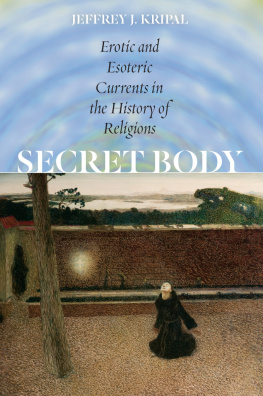
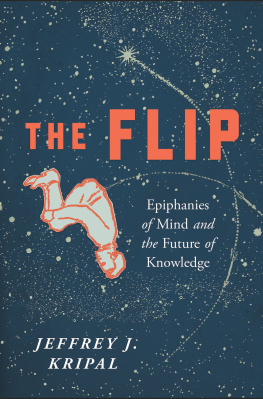

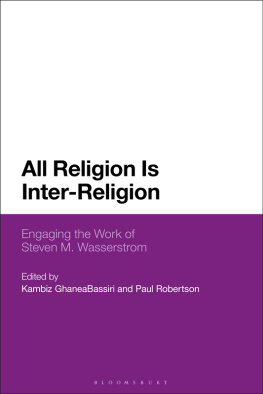
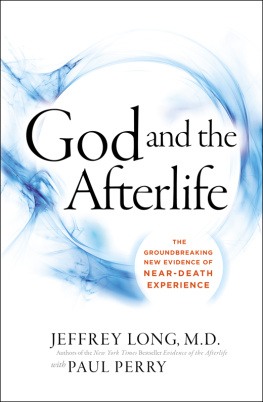
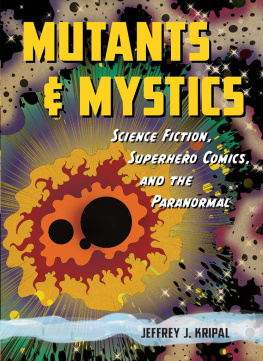
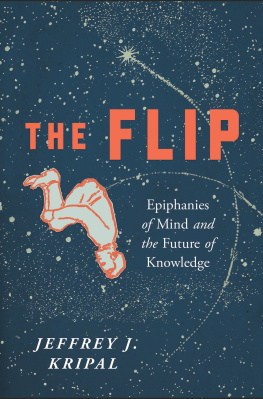
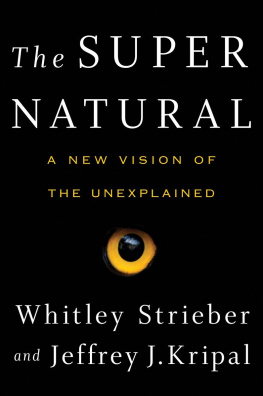
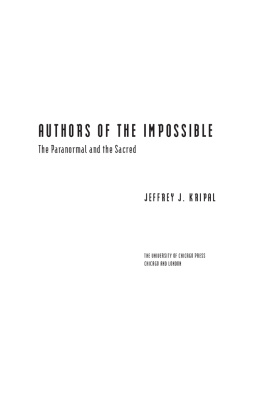
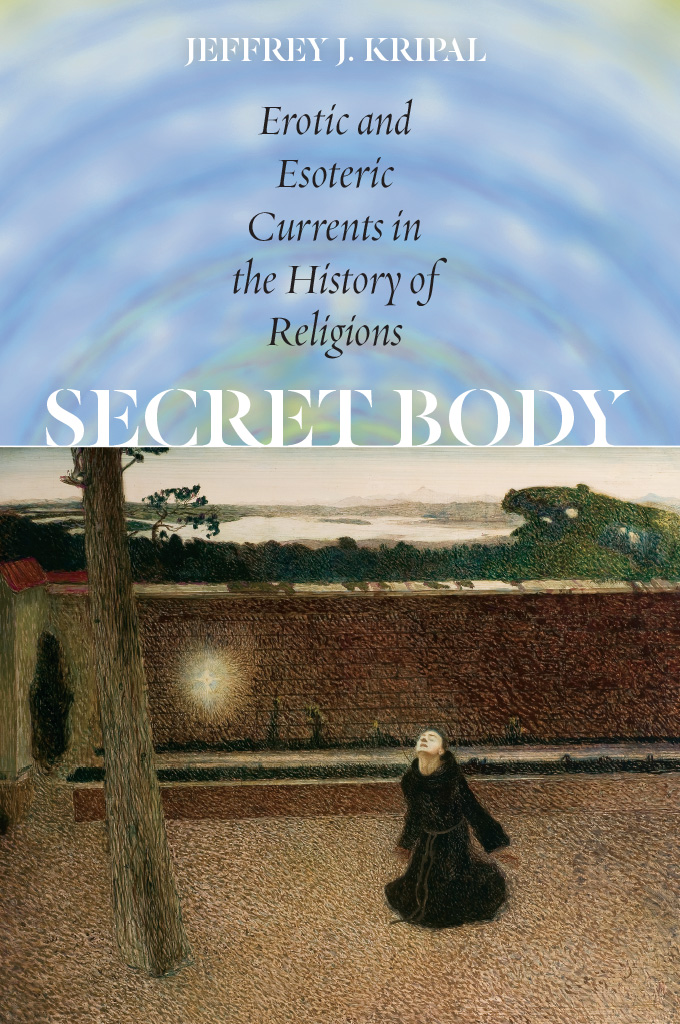
 This paper meets the requirements of ANSI / NISO Z 39.48-1992 (Permanence of Paper).
This paper meets the requirements of ANSI / NISO Z 39.48-1992 (Permanence of Paper).